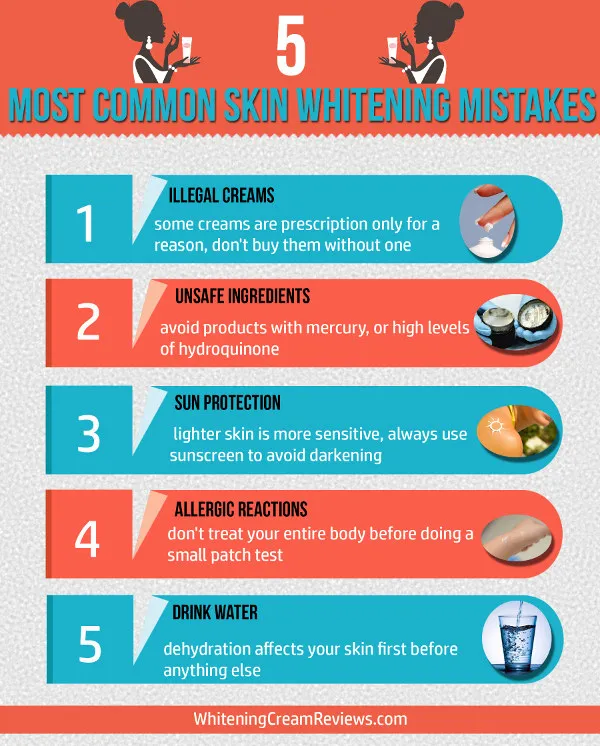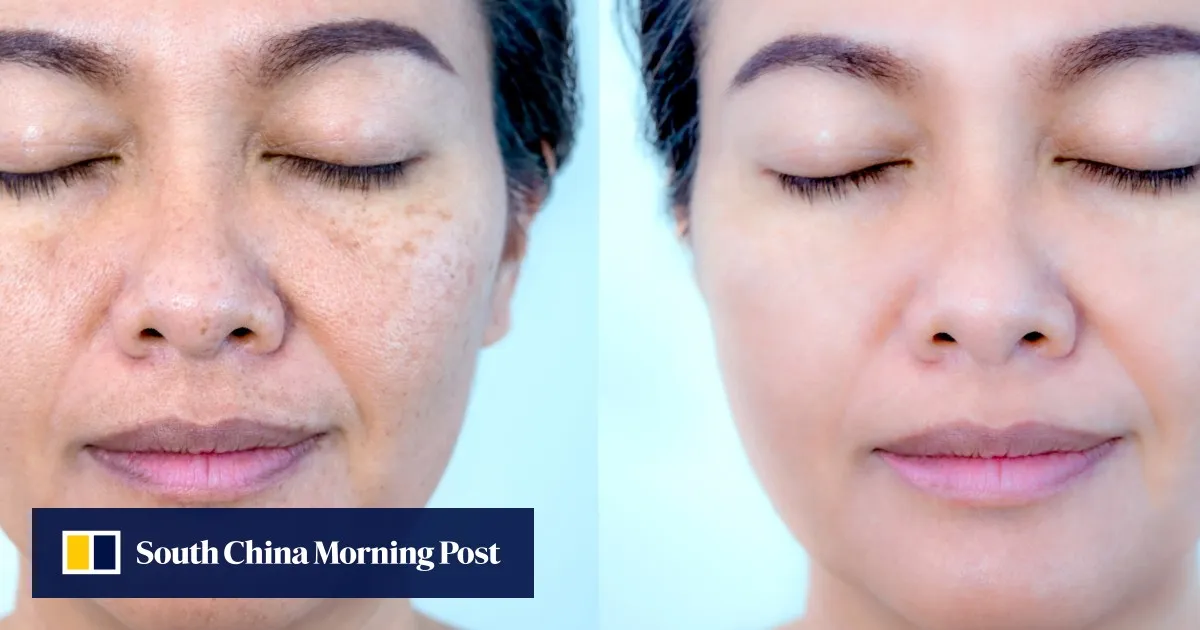Why Skin Whitening Stalls
Embarking on a skin whitening journey can be exciting, but it can also be frustrating when you don’t see the desired results. Many factors can contribute to why your skin whitening efforts might be stalling. Understanding these common pitfalls is the first step towards achieving the radiant, even-toned skin you desire. It is important to identify what is hindering your progress. This article will explore the top five reasons why your skin whitening might be stalled, providing insights and solutions to help you get back on track. By addressing these issues, you can optimize your skincare routine and increase your chances of success, unlocking the potential for brighter, more luminous skin.
Incorrect Product Choice
One of the primary reasons skin whitening efforts fail is the use of inappropriate products. The skincare market is flooded with products, and not all are created equal. Choosing the right products based on your skin type, concerns, and the underlying causes of discoloration is crucial. Products containing harsh chemicals or ineffective ingredients may not only fail to deliver results but could also worsen existing conditions. It’s essential to carefully evaluate the ingredients and consider a product’s formulation to ensure it aligns with your skincare goals. Consulting with a dermatologist can provide personalized recommendations and help you navigate the vast array of options available. Choosing the right product is very important.
Understanding Skin Whitening Products

Skin whitening products often work by inhibiting melanin production, the pigment responsible for skin color. Ingredients like hydroquinone, kojic acid, arbutin, and vitamin C are commonly used for their skin-lightening properties. However, the effectiveness of these ingredients can vary. For instance, the concentration of an active ingredient impacts the product’s potency. Additionally, the formulation (serum, cream, lotion) can affect how well the product penetrates the skin. Understanding these factors helps you make informed choices. Prioritizing products that are clinically proven, and formulated for your skin type, are important steps to make your skin whitening routine successful.
Common Product Mistakes
Several mistakes can undermine the effectiveness of skin whitening products. A common mistake is using products that are not suitable for your skin type. Oily skin may respond differently to ingredients than dry or sensitive skin. Over-the-counter products might not contain sufficient concentrations of active ingredients to produce noticeable results, and mixing incompatible products can reduce their effectiveness or even cause adverse reactions. Furthermore, using expired products or those stored improperly can lead to decreased potency and potential skin irritation. Always research, and if needed, consult a professional to select the most effective and safest products for your skin. This ensures that you are giving yourself the best chance to achieve skin-whitening success.
Inconsistent Application
Consistency is key to achieving visible results in any skincare routine, and skin whitening is no exception. Skipping applications, using products sporadically, or not following the recommended usage guidelines can significantly hinder your progress. Skin cells turn over in a cycle, so consistent use allows the active ingredients to work continuously, targeting pigmentation and promoting a more even skin tone. Without regular application, the effects of your products are diminished, and you are less likely to achieve the desired outcome. Make sure to incorporate your skin whitening products into a daily routine, and remember that patience is essential.
Importance of a Regular Routine

Establishing a consistent skincare routine is paramount for successful skin whitening. This involves applying products at the same times each day and integrating them seamlessly into your daily or nightly regimen. Consider setting reminders or integrating your skincare routine with other habits, such as brushing your teeth, to ensure consistency. Evaluate your lifestyle and choose products that you can realistically maintain in your routine. Consistency fosters a habit, making it easier to adhere to the regimen and improve your skin whitening results.
Best Practices for Application
Applying skin whitening products correctly is as important as using them consistently. Always start with clean, dry skin to maximize absorption. Follow the product’s instructions carefully regarding the amount to use and the order of application. Applying products in the correct order – from thinnest to thickest consistency – ensures that each product works effectively. Pay close attention to specific areas of concern, such as dark spots or uneven patches, and avoid applying products to areas that don’t require whitening. By following these best practices, you will boost the effectiveness of your efforts and enhance the likelihood of success.
Lack of Sun Protection
One of the most significant obstacles to skin whitening success is inadequate sun protection. UV radiation stimulates melanin production, which can counteract the effects of whitening products and worsen existing pigmentation. Without sufficient sun protection, your skin whitening efforts are likely to be in vain. Even on cloudy days, UV rays can penetrate the skin, so consistent sun protection is non-negotiable. Sun protection should be integrated into your daily skincare routine to ensure the best results from your skin whitening treatments.
The Damaging Effects of Sun Exposure

Sun exposure causes a cascade of damaging effects on the skin, including accelerated melanin production, which leads to tanning and the darkening of existing pigmentation. This effect undermines skin whitening efforts and can also result in premature aging, such as wrinkles and age spots. UV radiation also damages collagen and elastin, leading to skin elasticity loss. Consistent sun exposure can worsen conditions like melasma and post-inflammatory hyperpigmentation, making skin whitening treatments less effective. It is crucial to understand that the sun is your enemy when it comes to skin whitening.
Choosing the Right Sunscreen
Choosing the right sunscreen is essential. Opt for a broad-spectrum sunscreen with an SPF of 30 or higher to protect against both UVA and UVB rays. Apply sunscreen generously at least 15 minutes before sun exposure, and reapply every two hours, or more often if swimming or sweating. Consider the environment you are in, and the activities you are doing, to determine the right SPF. Sunscreen should be a daily habit, regardless of the weather, to protect your skin and maximize the effectiveness of your skin whitening treatments. Using a good sunscreen is a must-have.
Unrealistic Expectations
Setting unrealistic expectations can lead to disappointment and frustration. Skin whitening is a gradual process, and it requires patience and realistic goals. Expecting overnight results is unrealistic. Factors such as the depth and type of pigmentation, your skin’s natural regeneration cycle, and the efficacy of the products used will all influence how long it takes to see results. Focusing on small, incremental improvements, and tracking your progress, can help to stay motivated. Remember that consistency and patience are critical in achieving your desired results. It is important to manage your expectations to avoid unnecessary frustration.
Setting Achievable Goals

When starting a skin whitening regimen, start by setting achievable goals. Rather than aiming for a drastic change, focus on small, incremental improvements, such as reducing the appearance of dark spots or achieving a more even skin tone. Track your progress by taking photos, and documenting how your skin reacts to different products. This helps to objectively assess whether your efforts are effective and helps you adjust your approach. Celebrate your progress, no matter how small, as it builds your motivation and reinforces your commitment to the process. This is critical when you start skin whitening.
The Importance of Patience
Patience is paramount. Skin cells turn over at a natural rate, typically every 28-40 days, which means you may not see noticeable results for several weeks or even months. Remain patient. Stay consistent with your skincare routine, and avoid the temptation to switch products frequently, which can often disrupt the process. Building healthy habits takes time, and it is not different when it comes to skin whitening. Staying committed to your routine, and understanding that success takes time, will help you remain positive throughout your skin whitening journey.
Underlying Skin Conditions
Certain underlying skin conditions can interfere with skin whitening efforts. Conditions such as melasma, eczema, and psoriasis can cause uneven pigmentation or inflammation, making skin whitening treatments less effective. These conditions often require specific treatments and approaches. Before starting any skin whitening regimen, it’s crucial to identify whether you have any underlying skin conditions, since addressing those issues is the first step toward successful skin whitening. Consulting with a dermatologist is the best way to identify any skin condition, and create a personalized skincare plan that considers these factors.
Identifying Potential Issues

To ensure that your skin whitening efforts are successful, start by identifying any potential underlying skin conditions. Look for symptoms like persistent redness, itching, or unusual skin changes. If you notice any of these symptoms, consult a dermatologist. They can accurately diagnose conditions that might hinder skin whitening progress. It is a good idea to consult with a dermatologist before starting any new skincare regimen. Addressing these conditions will help you to effectively target pigmentation concerns.
When to Consult a Dermatologist
Consulting a dermatologist is crucial when you face challenges with skin whitening. They can provide expert guidance, diagnose underlying skin conditions, and recommend effective treatments tailored to your specific needs. Seek professional help if you experience adverse reactions to your skincare products or if you do not see any improvement after several weeks of consistent use. A dermatologist can perform tests, prescribe medications, and develop a comprehensive skin whitening plan that maximizes your chances of success. This is critical for those who want to see fast results.
In conclusion, understanding the common reasons why skin whitening efforts might be stalled is crucial for achieving your desired results. By addressing incorrect product choices, inconsistent application, lack of sun protection, unrealistic expectations, and underlying skin conditions, you can significantly improve your chances of success. Remember that consistency, patience, and professional guidance are all key to achieving brighter, more radiant skin. By addressing these five key areas, you will be well on your way to achieving your skin whitening goals.
